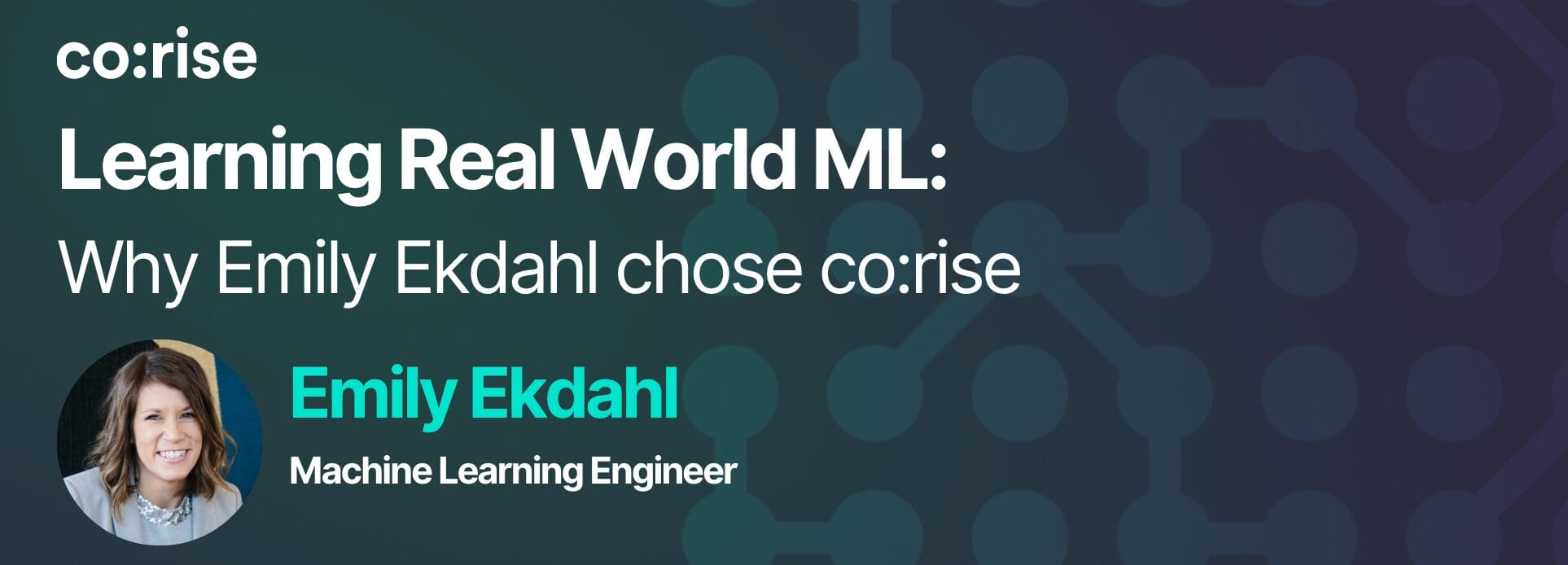Why Emily Ekdahl chose co:rise to level up her job performance as a machine learning engineer
Find out what one of the first learners to complete the co:rise Machine Learning Foundations track said about her experience in the track and what she’s tackling next when she recently talked to Julia Stiglitz, co:rise co-founder and CEO.

Emily Ekdahl is a Senior Machine Learning Engineer, and was one of the first learners to complete the co:rise Machine Learning Foundations track. She recently talked to Julia Stiglitz, co:rise co-founder and CEO, about her experience in the track and what she’s tackling next. The following excerpts from their conversation have been edited and condensed for clarity.
Julia: Emily, you were one of the first people to sign up for the Machine Learning track on co:rise. What was it about those courses that caught your attention or inspired you?
Emily: I’m currently enrolled in a Master’s program in Data Science and I’m also working full-time as a machine learning engineer. When I saw the content of the co:rise track, I thought, this is exactly what I need. If I take these courses, in three months I’ll understand my job better and I’ll be able to perform at a higher level.
The other thing that drew me to the track was the instructors. When you’re learning from someone like Dr. Andrew Maas, who’s been in the field for 15 plus years, you really trust the information you’re getting. For me, that meant that when I used something I learned in class to make a recommendation at work, I felt really confident. I could say, “This is something I learned from someone who’s worked on these problems in the real world, who’s started their own companies, who’s failed and learned from mistakes.” The lessons carried a lot of weight.
Julia: That’s great. Can you tell me a little bit more about your experience going through the track? What were some of the highlights?
Emily: I loved it when the instructors would present a state-of-the-art method and simplify it in a way that might have taken you years to figure out on your own. They would say something like, “in most real-world scenarios, you’re going to want to default to this particular method or best practice, and here are the two or three most common exceptions to that.” For example, when you go and look at documentation, you might have 15 options for passing a parameter. So when someone tells you that one of those is the best option most of the time, that’s enormously helpful.
The other thing that was a huge highlight for me was in the second course, Deep Learning Essentials, Kevin and Eric Wu taught us how to read machine learning papers. We all know we need to be reading papers, but they are intimidating. Kevin and Eric gave us specific strategies for how to extract key information efficiently in 5-10 minutes per paper. They also shared that reading papers can be tricky for anyone, even people with a lot of experience in the field, because there are so many sub-specializations within machine learning. That made me feel like, "Oh, okay, reading papers is something I can do!"
Julia: What was the community like? How much did you interact with the instructors and the other learners?
Emily: Honestly, it was amazing. Being able to spend so much time with Julie, who was a TA in the first course, was great. She was so helpful, humble, and approachable, even though she has all of this incredible expertise and experience. Every time we would work on something together, I was like, "I can't believe I just get to pair with you for 30 minutes.” I really enjoyed all the TA sessions, actually, even when there was a bigger group of people asking lots of different questions. Sometimes I’d answer a question from someone else in the course and I’d get a lot out of just thinking through how to explain a concept to someone. That deepens my learning, and it's interesting and fun.
One thing I’ve definitely noticed about co:rise is that people are here to learn. Some of those TA sessions were intense, just in terms of the number of questions and how deep people wanted to get into the material!
Julia: I heard that you ended up pausing your master's program while you were focused on your co:rise courses. I'd love to hear why you made that decision.
Emily: Taking a grad school class and the co:rise courses at the same time was a bit ambitious, especially because I’m also working full-time and I was relatively new in my machine learning role. I decided to focus on the co:rise courses because they were directly applicable to my day-to-day work. I would lift code that I had written for the course on Sunday and repurpose it for a project at work on Monday.
Right now, I’m taking two more courses on co:rise, ML Ops and Natural Language Processing and QAing the Computer Vision course. I am returning to my Master’s program in the fall. I definitely feel like it was the right choice to pause and focus on the co:rise Machine Learning classes. It has made a huge difference in my job performance.
The next run of the Machine Learning Foundations track start September 5th. Learn more here!
